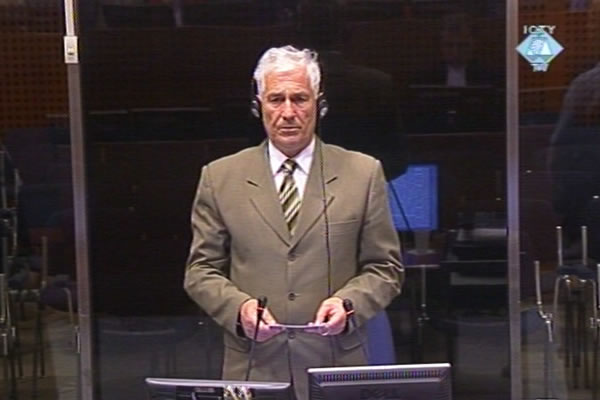Home
MRKSIC BEGINS HIS EVIDENCE AS GOTOVINA’S DEFENSE WITNESS
On the first day of his evidence at the trial of the Croatian generals for crimes during Operation Storm, former Krajina Serb army commander Mile Mrksic has said he was appointed to that post at the insistence of Slobodan Milosevic, who told him about an agreement with Tudjman and ordered him to stabilize the military and political situation in the RSK and create preconditions for negotiations with Croats
 Mile Mrkšić, svjedok odbrane Ante Gotovine
Mile Mrkšić, svjedok odbrane Ante Gotovine Although he indicated earlier that he ‘may not be willing’ to give evidence in Gotovina’s defense, former Serbian Krajina Army (SVK) commander Mile Mrksic appeared today before the court to answer the questions of the defense, but with a minor caveat. Mrksic agreed to start evidence without his lawyers, but warned the judges that they would ‘have to keep an eye on what I’m doing in the courtroom’ as he might say something to incriminate himself. After the judge convinced him that they would do so, adding that Mrksic’s lawyer Domazet was expected to arrive tomorrow, Mrksic made a solemn declaration to tell the truth and started his testimony.
In response to the questions by Gotovina’s defense counsel Luka Misetic, the witness said that in late May 1995, approximately two months before Operation Storm, he was transferred from the post of the deputy defense minister in the FRY government at the behest of Slobodan Milosevic to the post of the SVK commander. As soon as the Serbian Krajina assembly confirmed the appointment, Mrksic went to Karadjordjevo where he met with Milosevic, who allegedly told Mrksic then that the Krajina question ‘could no longer be resolved militarily but only politically’ and that the goal must be to achieve ‘coexistence with Croats’. That is why the RSK army was to be strengthened to restore the people’s trust in it, because that would force the politicians on both sides to negotiate. ‘I agreed with Franjo to give you five months to consolidate the army to prevent the war’, Milosevic allegedly said, meaning the Croatian president Tudjman. As Mrksic noted, Milosevic ‘was on good terms’ with Tudjman.
The witness described how he tried to professionalize the Krajina army although he faced a shortage of good troops: the best fighters had left for Serbia ‘to do some smuggling’ and ‘only old men remained’ to defend their homes. Mrksic’s goal was, he said, to restore the SVK to its 1994 status, when it held fast the positions; it was necessary to launch an attack on Mount Dinara and the Grahovo-Livno line as a priority. Milosevic, however, had different ideas, and ordered the operations to focus on the Cazin Krajina and on the assistance to Fikret Abdic’s forces in their fight with the BH Army Fifth Corps. In an operation called Spider, the Republika Srpska forces were deployed together with the Serbian State Security personnel. Mrksic first said that the Serbs were in ‘command of the Spider’, and then admitted that at one point he himself took over the command of the operation.
On the one hand, Mrksic’s replies favored Gotovina’s defense, which claims that the strings in Krajina were pulled from Belgrade, that Croatia had every reason to fear the advance of the Serb joint forces towards Bihac and a ‘replay of Srebrenica’ and that in the summer of 1995, the Krajina army was far stronger that the prosecution claimed. On the other hand, Mrksic said that the elite SVK troops were neither particularly large nor dangerous.
As he began his evidence, the witness said he had kept silent for too long ‘bearing the burden within for 14 years’. Today, when he finally decided to talk, Mrksic often spoke too long and too fast. The interpreters were unable to catch up with him and he was repeatedly cautioned. Mile Mrksic awaits his transfer to a country where he would serve his 20-year sentence. In May 2009, he was convicted of aiding and abetting the murder of more than 200 Croatian prisoners at the Ovcara farm near Vukovar in November 1991.
Linked Reports
- Case : Gotovina et al. - "Operation Storm"
- 2009-06-12 IMMUNITY FOR GOTOVINA'S INVESTIGATOR
- 2009-06-09 WHAT MADE TUDJMAN ‘CHUCKLE’
- 2009-06-08 LINGUISTICS AT THE BRIJUNI MEETING
- 2009-06-18 PEOPLE WERE DRILLED TO FLEE INTO THE WOODS, NOT TO SERBIA
- 2009-06-19 ACCURATE FIRE ON MILITARY TARGETS, RANDOM TARGETING OF CIVILIANS
- 2009-06-22 MRKSIC: SHELLING AIMED AT 'DRIVING THE PEOPLE CRAZY'
